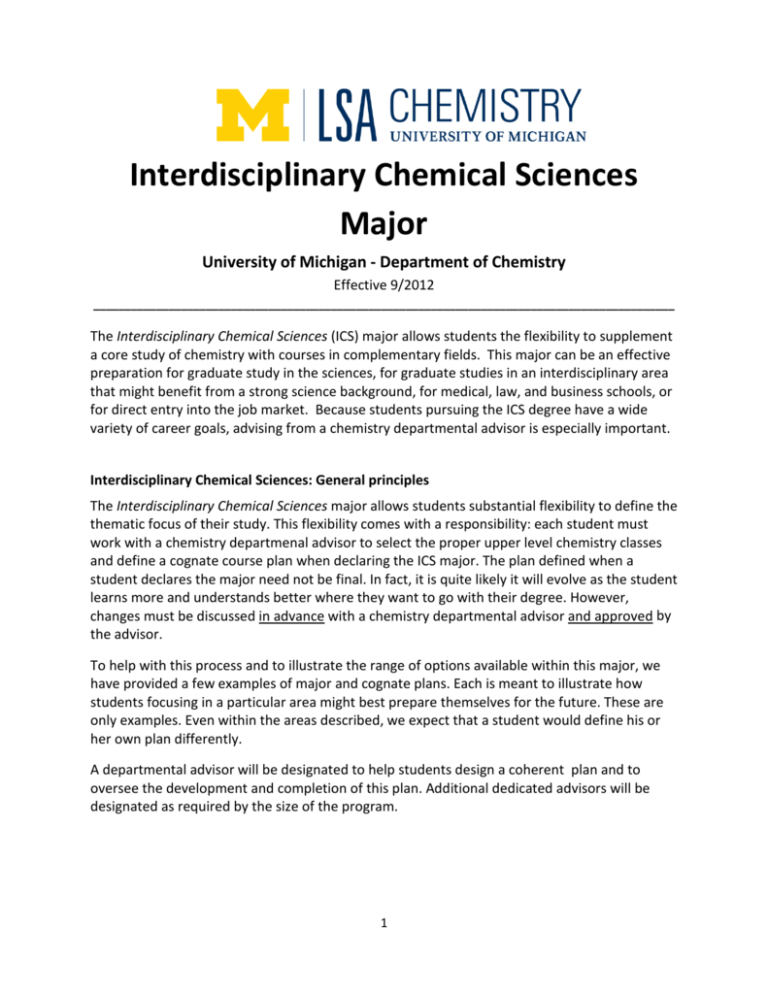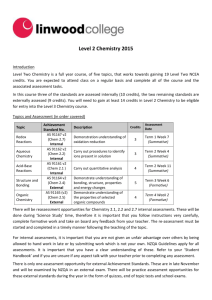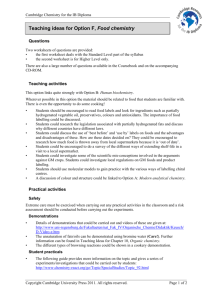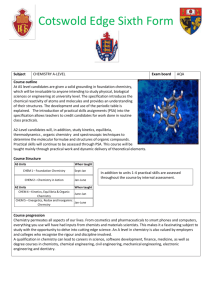Interdisciplinary Chemical Sciences Major
advertisement

Interdisciplinary Chemical Sciences Major University of Michigan - Department of Chemistry Effective 9/2012 _____________________________________________________________________________________________ The Interdisciplinary Chemical Sciences (ICS) major allows students the flexibility to supplement a core study of chemistry with courses in complementary fields. This major can be an effective preparation for graduate study in the sciences, for graduate studies in an interdisciplinary area that might benefit from a strong science background, for medical, law, and business schools, or for direct entry into the job market. Because students pursuing the ICS degree have a wide variety of career goals, advising from a chemistry departmental advisor is especially important. Interdisciplinary Chemical Sciences: General principles The Interdisciplinary Chemical Sciences major allows students substantial flexibility to define the thematic focus of their study. This flexibility comes with a responsibility: each student must work with a chemistry departmenal advisor to select the proper upper level chemistry classes and define a cognate course plan when declaring the ICS major. The plan defined when a student declares the major need not be final. In fact, it is quite likely it will evolve as the student learns more and understands better where they want to go with their degree. However, changes must be discussed in advance with a chemistry departmental advisor and approved by the advisor. To help with this process and to illustrate the range of options available within this major, we have provided a few examples of major and cognate plans. Each is meant to illustrate how students focusing in a particular area might best prepare themselves for the future. These are only examples. Even within the areas described, we expect that a student would define his or her own plan differently. A departmental advisor will be designated to help students design a coherent plan and to oversee the development and completion of this plan. Additional dedicated advisors will be designated as required by the size of the program. 1 Prerequisites: As a prerequisite for the major students must complete the following courses in Mathematics and Physics, or their equivalents. Some plans will include courses that require additional prerequisite courses including the second term of physics, additional math courses, and/or introductory biology courses but these are not explicitly required for the major. Course # Course Description Term Completed Grade MATH 115 Calculus I MATH 116 Calculus II One of the following groups; 135/136 or 140/141: PHYS 135/136 Physics for the Life Sciences I OR PHYS 140/141 General Physics I/ Elementary Laboratory I Credits 4 4 4/1 4/1 The Interdisciplinary Chemical Sciences Program must include the following: The Interdisciplinary Chemical Sciences program requires a minimum of 27 credits in chemistry. These classes must be completed with a minimum grade of a C- in each one. The major includes required core courses covering the major areas of chemistry: organic, inorganic, analytical and physical. Core courses: Course # Course Description Term Completed CHEM 210 Structure and Reactivity I CHEM 211 Investigations in Chemistry CHEM 260 Chemical Principles One of the following groups; (241 and 242) OR (245, 246 and 247): CHEM 241 Introduction to Chemical Analysis CHEM 242 Introduction to Chemical Analysis Laboratory OR CHEM 245 Biomedical Analytical Chemistry CHEM 246 Biomedical Analytical Chemistry Laboratory I CHEM 247 Biomedical Analytical Chemistry Laboratory II One of the following; 302 or 303: CHEM 302 Inorganic Chemistry: Principles of Structure, Reactivity, and Function OR Introductory Bioinorganic Chemistry: The Role of Metals CHEM 303 in Life 2 Grade Credits 4 1 3 2 2 2 1 1 3 3 The remaining 12 credits may be selected from departmental offerings, but must include at least 3 chemistry courses numbered 300 and above. At least one of these must be a lecture course at the 400-level. The ICS program also requires at least 15 credits of cognate courses as part of a plan designed with the prior approval of a chemistry departmental advisor. These credits must be at the 200level or above. It is expected that at least two courses (6 of the cognate credits) will be at the 300-level or above. Elective Courses: Course # Course Description Term Completed Grade Honors in Interdisciplinary Chemical Sciences (ICS) Students who have a cumulative grade point average of at least 3.4 are encouraged to elect honors in the Interdisciplinary Chemical Sciences. They must also complete an honors thesis based on research [CHEM 399 (4) / CHEM 499 (1)] under the supervision of a faculty member. Students in this major may be pursuing a dual degree and/or undertaking research in a cognate department. Research affirmed as part of the Chemical Sciences by a member of the chemistry faculty may be used to satisfy this requirement. 3 Credits





